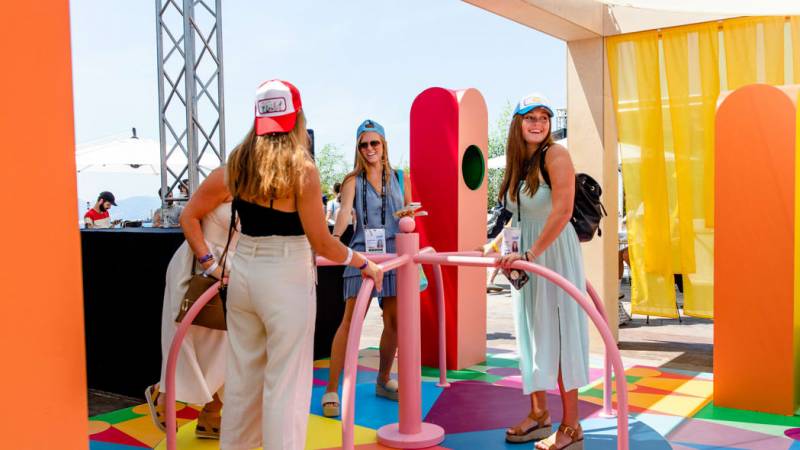Over the enduring pandemic, designer Yinka Illori's studio has shared the spirit of hope through two inspiring murals pasted in London this summer.
The phrases "Better days are coming I promise," and "As long as we have each other we'll be okay," -- both graphically printed in vivid hues like neon green and hot pink -- were created for Chelsea and Westminster Hospital NHS Foundation Trust.
Ilori is firing up the London design scene right now with bright, maximalist architecture, interior design and art projects that are distinctly optimistic in spirit. The London Design Festival recently awarded him an Emerging Design Medal for his breadth of contributions to the industry, just three years into him establishing Studio Yinka Ilori.
A mural by Yinka Ilori in Blackfriars, London, inspired by NHS workers
A mural by Yinka Ilori in Blackfriars, London, inspired by NHS workers Credit: Courtesy Yinka Ilori Studio
For the British-born Nigerian designer, there is no detachment from his profession. "My work is always an extension of me, It's like my kind of microphone," Ilori said over a video call. Each of his projects hint at his own upbringing.
Ilori's color emporium "Playland," from 2019, was an adult playground done for Pinterest at Cannes Lions International Festival of Creativity. Through an explosion of patterns on a seesaw, merry-go-round and podium, he paid tribute to the north London council estate that he grew up in, which was a "melting pot of culture," he explained.
How architect Mariam Kamara is masterminding a sustainable future for Niger
Meanwhile the traditional Dutch wax prints worn by his family inspired the geometric designs in a pavilion he co-created with architecture firm Pricegore at London's Dulwich Picture Gallery in 2019. The design was a celebration of the diversity of the capital, and alluded to the area called Little Lagos, in the neighborhood of Peckham just a stone's throw away.
But it wasn't always easy for Ilori to bring his personal history into the work.
The Colour Palace Dulwich pavilion by Studio Yinka Ilori, in South London
"As a kid I was just trying to know how to celebrate both of my cultures," he recalled. He felt like he was living a double life. His parents moved from Nigeria in the 1980s, and in the UK family home, Ilori was immersed in his family's native language and clothing, which were in vast contrast to the British Western ways he was navigating outside.
When he first traveled to Nigeria at around age 12, he remembers his realization that fusing the two worlds could be powerful. "Okay, now I get what it means to be a British Nigerian," he said.
Narrative designs
The pioneering Cameroonian designer taking on haute couture
Ilori had an innate fascination with the textures and bold hues of his family's rich heritage, but it was the parables that his parents taught him that really stuck. These were about love, respect and loyalty. According to the designer, a centuries-old Nigerian parable, "No matter how long the neck of a giraffe is, it still cannot see the future," led to his five-piece collection of upcycled chairs back in 2013. That project kicked off his signature style of integrating narratives into his work.
A close-up view of the pavilion Ilori designed at the Dulwich Picture Gallery in London
The chairs were based on his classmates, some of whom "the teachers didn't believe in," he said. Yet many grew up to have successful careers. "Guys who were seen as failures are now successful actors and doctors," he said. Ilori layered the vintage, previously rundown chairs with abstract and decorative surprises to share a lesson from this childhood story -- that we should not be judgemental.
Finding his way
Despite encouragement from his parents to study engineering, Ilori knew from an early age that he wanted to take a path in the creative industries, so he studied art and design at London Metropolitan University.
"I didn't feel confident enough to bring my culture into my design process because our references were Western ways of thinking, and I couldn't relate," he said of his experience studying there.
From the "Parable Chairs" collection by Studio Yinka Ilori
But when renowned British homeware designer Lee Broom hired Ilori for an internship, seeing how Broom developed his own aesthetic encouraged Ilori to set up a studio where he could openly share his identity. "I just thought there was no other kind of studio like (mine) out there."
The young West Africans finding their voice through streetwear
The young West Africans finding their voice through streetwear
In 2011, he managed to kickstart with a loan of £3,500 (around $ 4,400) from the Prince's Trust youth charity. When he was just starting out, he recalls that "no-one really understood what I was trying to do." His mixture of colors, his influences from parables and his use of upcycling was different, he explained.
"(Some designers) want to feel accepted, or be put into a certain type of bracket, but for me it didn't work for me that way...the design world is quite privileged, and in a way can be quite elitist, but that's not what design is about -- design should be for everyone."
A daring vision
By the time Ilori officially established his studio in 2017, his work no longer stood alone. He is joined by a cohort of British designers like Camille Walala and Morag Myerscough who are capturing the magic of bold prints and palettes in interiors and immersive public artworks.
Award-winning British Nigerian designer Yinka Ilori
"There is a huge shift in maximalism," Ilori said. "It's come back again, and I think it is going to stay for a very long time.". The approach directly challenges the concept of less-is-more, or, utilitarian design that is more muted and streamlined.
Black Shades Project
The forgotten stars of Malian photography's Golden Age
Ilori's approach to maximalism is a unique one that has caught the eye of many, including renowned architect David Adjaye. "Yinka's work tells a playful, humorous story, but look beneath and there's a real richness and depth," he has said.
Nowadays Ilori says commercial clients give him "freedom to just do Yinka." From his stripey Estate Playground for CitizenM Hotel -- an ode to the public playground from his youth -- to an indoor skatepark in Lille, France, that is a color-blocking paradise, all of the commissions have the Ilori DNA.
Close-up view of the "Playland" project for Pinterest
Ilori's North West London studio is still small, but the five-strong team is like the cultural melting pot of his childhood council estate, with Greek, Japanese, Taiwanese and Nigerian influences pouring in. He says he has come a long way since he was "shy, and really trying to find myself."
MMA Design Studio
How African 'feng shui' can shape the continent's cities of the future
Ilori continues to inspire with recent endeavors, including Selfridges window displays where he has realized scenes of natural environments dedicated to flowers, sunsets and forests. On his Instagram feed, he wrote that the project "has been a dream of mine from when I was a kid."
SOURCE : CNN




